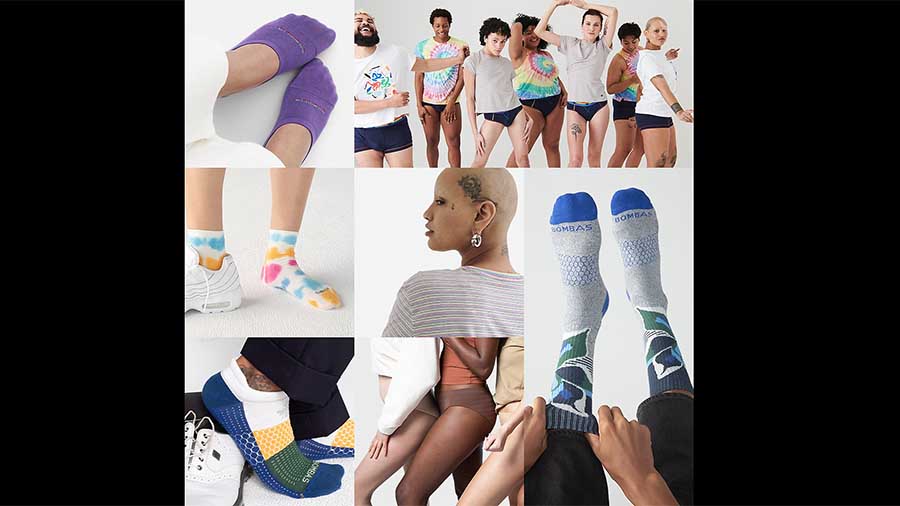Bombas was the top-ranked U.S. active/casual lifestyle brand in Stifel’s just-released Sustainable Lifestyle Brands Index. Also making the Top 5 was Patagonia, at number two; The North Face, three; Adidas, four; and Allbirds, five.
Rounding out the Top 10 were Hydro Flask, followed by a four-way tie at seven between Puma, Rothy’s, Yeti, and Columbia.
Stifel’s study found newer brands that have staked their brand identity on corporate responsibility and environmental sustainability, including Bombas, Allbirds, Rothy’s, and Yeti, and scored exceptionally high in its Index, indicating effective messaging with the category purchasers in the U.S.
The Index also highlights the evolved sustainability practices and effective communication of outdoor brands—Patagonia, The North Face, and Columbia—and European athletic lifestyle brands with advanced sustainability initiatives—Adidas and Puma.
“Brands will continue to compete on innovation, product quality, customer experience, and value, but sustainability is becoming another key factor in the minds of consumers,” said Jim Duffy, managing director and Sports and Lifestyle Brands analyst at Stifel, in a statement.
Brands were measured according to Three Metrics of Sustainability: Environmental, Social, and Ethical Business Practices.
- The Top 10 scoring active lifestyle brands based on Environmental Sustainability were The North Face, Patagonia, Hydro Flask, Bombas, Allbirds, Columbia, Rothy’s, Rhone, Yeti, and Adidas.
- Based on Ethical Business Practices, the Top 10 scoring companies were Bombas, Patagonia, The North Face, Adidas, Carhartt, Yeti, Puma, Keen, and Rothy’s with Allbirds, Columbia, On Running, and Under Armor tied for the tenth position.
- Graded on Social Sustainability, the Top 10 scoring brands were Bombas, Adidas, The North Face, Vuori, Jordan, Allbirds, Puma, Under Armor with Columbia and Nike tied for ten.
The findings were based on a Morning Consult online survey of 10,015 active/casual lifestyle brand consumers ages 18 to 55 in the U.S., the U.K., Italy, Germany, France, and Mainland China from April 16 to 25.
Key findings among the 4,756 U.S. respondents included:
- 83 percent believe it’s important for brands to act sustainably; 39 percent consider it “very important”;
- 71 percent report caring more now about buying sustainable products than a year ago, and 58 percent intend to buy fewer products for the sake of sustainability;
- Nearly three-quarters, 73 percent, considered sustainability when choosing between brands;
- More than two-thirds, 67 percent, said they would pay more for brands with leading sustainability practices, and half, 52 percent, regularly opt for more expensive products;
- Some of the top sustainability priorities respondents consider “very important” include giving workers fair pay and benefits, 60 percent; supporting racial equality, 48 percent; and protecting local environments and ecosystems, 43 percent; and
- Nearly half, 46 percent, have either boycotted or have stopped buying a brand or product precisely because of sustainability.
The survey continued to find that sustainability falls behind quality, customer service and lower prices in prioritization for brand focus. Among U.S. respondents, 39 percent said operating sustainably is “very important.” The same “very important” priority rated 79 percent for quality and reliability of products or services, 59 percent for convenience and customer experience, and 51 percent for offering lower prices.
Among activities, snow sports enthusiasts were found to be more likely to look for information about a brand’s sustainability practices and more open to paying more for “leading sustainability practices.” For example, among U.S. respondents that identified snow sports as a hobby, 10 percent said they would pay up to 10 percent more on brands with leading sustainability practices, 17 percent would pay up to 50 percent more, and 11 percent would pay more than 50 percent.
Enthusiasts in cycling/skating, yoga/Pilates and sports, in general, were also found to over-index in basing their purchasing decisions and willingness to pay more based on a brand’s sustainability position.
Enthusiasts in fitness/strength and hunting/fishing were found to be less likely to favor brands with strong, sustainable positions.
Also, over-indexing in prioritizing and being open to paying for sustainable brands were high outdoor apparel and sporting/recreational equipment spenders and Males, Millennials, Gen Z, Democrats, Hispanic, Black Americans, and Urbanites.
Among the 5,259 international respondents, the majority of category purchasers said they are trying to be more sustainable daily. A large majority of consumers said it’s important for brands to focus on operating sustainably, with at least 1-in-3 saying it’s “very important” in each market. However, like the U.S., priorities like quality/reliability and convenience/customer experience across markets were found to be more important than sustainability practices.
Additional findings include:
- Italy had the highest percentage of category purchasers respond that overall sustainability matters were “very important”;
- German category purchasers showed the greatest willingness to pay a premium for leading sustainability practices, with 76 percent indicating comfort with the higher product;
- China survey responses showed a lower emphasis on sustainability measures, though it was the only emerging market country surveyed. Relative to the U.S., Chinese category consumers place greater emphasis on advocating for environmental causes publicly, reducing carbon emissions and a lower focus on protecting human rights in the global supply chain and investing in the communities brands operate in;
- France has the highest number of sustainability-conscious consumers out of the six surveyed countries. Environmental sustainability is relatively more important, with ensuring products are recycled, reducing carbon emissions, using less energy and water, and advocating for environmental causes each more important to category purchasers; and
- U.K. responses most closely approximated those of the U.S. Ethical Business Practices were the most important form of sustainability to U.K. category purchasers, followed by Environmental Sustainability and then Social Responsibility. U.S. survey responses demonstrated the same ranked prioritization.
Full survey results can be found here.
Photo courtesy Bombas
















